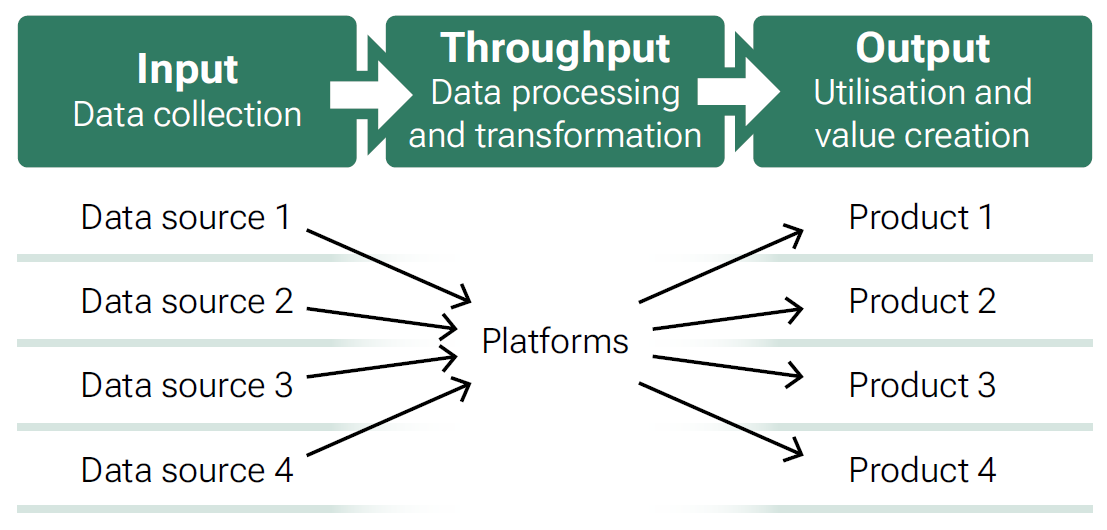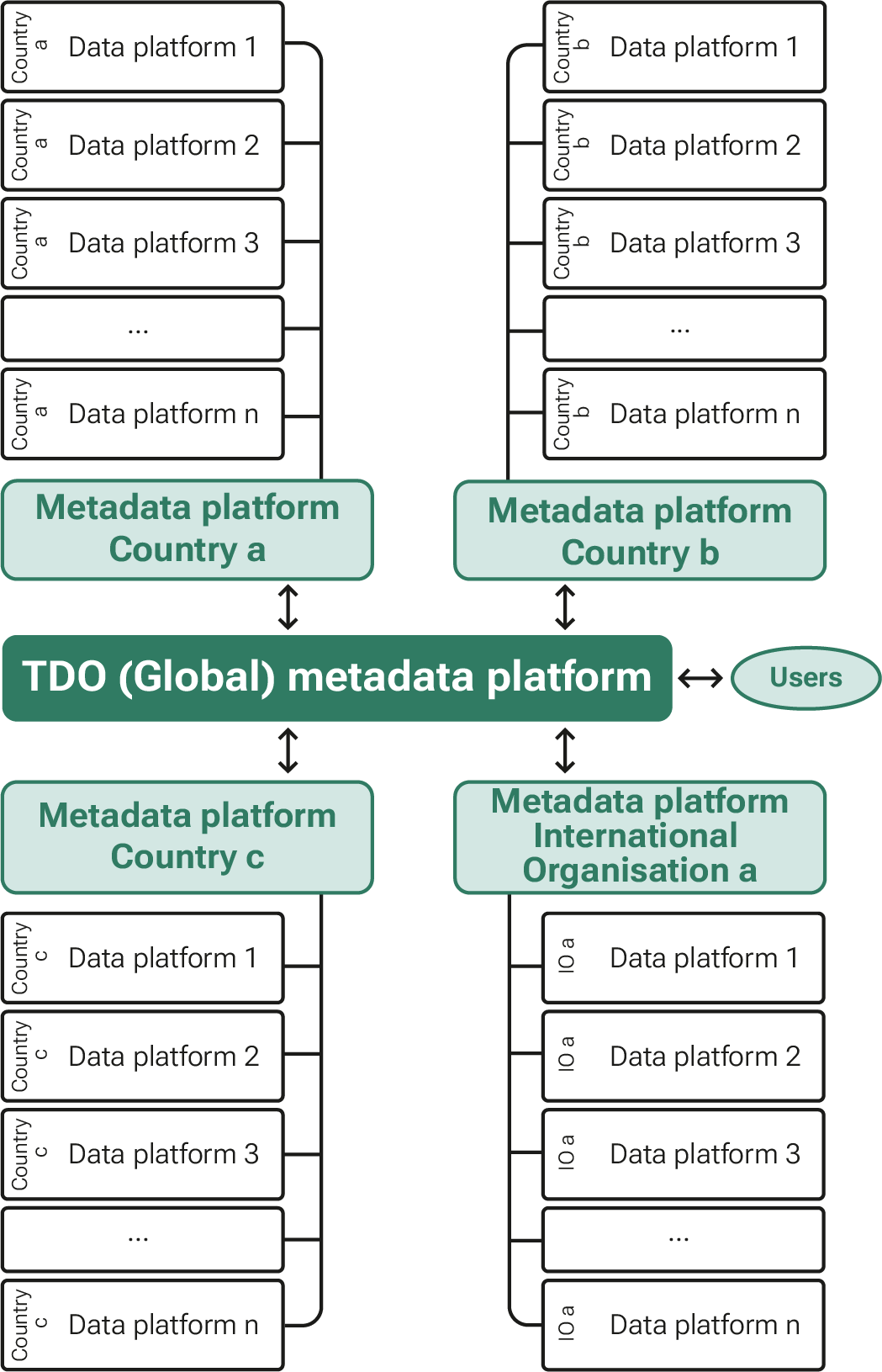The Trusted Data Observatory will serve as a central hub, making reliable information easier to find, understand, and use.
For a world where trusted data is accessible to all, empowering informed decisions and countering misinformation.
CONTEXT
The challenges of accessing and using reliable data
Data is the starting point for information, knowledge and insight. Finding the data you need when you need it, especially from trusted or official data sources, can be difficult. Lexical search engines and AI-enabled search engines can compile such data in a very short time, but they collect the information from any text sources of the world wide web. Moreover, data so far mostly exists in separated areas, in so-called silos. The data is often collected or gathered for a specific purpose. It can often only be used for this purpose.
What is metadata?
Metadata is “data about data” and is the key to data discovery, and an assessment of accessibility, and comparability. In many cases it is the absence of structured, standardisedor indeed machine-readable metadata that creates difficulties when trying to distinguish fake news/alternative facts from robust and reliable information.
Challenge
What roles do platforms play in the data journey?
Data collected for one purpose – for example administrative records – can often be re-used for other purposes like statistical analyses. But often, the existence of such useful data is not known to those who want to create a data-based product. Metadata platforms make such data findable and thus enable the secondary or multiple use of data and the implementation of the “once only” principle, whereby individuals and companies only have to report certain information to the authorities once.
Harmonising such data and making it findable and accessible can significantly increase the variety of possible products, findings, and uses that can be produced.
For example, the harmonisation and linking of data on people’s health and place of residence could automatically identify new correlations between environmental factors and certain disease patterns and thus provide information on possible causes of disease. At the same time, harmonisation also enables automated data analyses and thus cost reductions.

Solution
Introducing the Trusted Data Observatory (TDO)
The Trusted Data Observatory is a future global metadata platform, which will describe trusted data from trusted sources, making them visible, comparable, and accessible. This initiative is being driven by the Swiss Confederation in collaboration with the Geneva data community. The aim is to incorporate this platform into official UN processes sooner or later.
Goals of the TDO
Is a TDO feasible?
In 2024, a study on the feasibility of a Trusted Data Observatory, commissioned by the Swiss Federal Department of Foreign Affairs and the Swiss Federal Statistical Office, was conducted by an independent consultant. The study showed that the potential added value of creating a Trusted Data Observatory is significant. The study also identifies some challenges, such as the absence of metadata or indeed metadata of varying quality, the usage of different metadata standards, the risk of creating a metadata swamp, identifying the appropriate governance structures for the observatory, the business model and how it can be sustained over time, the incentive for data compilers to develop their metadata and engage with the observatory, and creating an active user base for the observatory.
From idea to action: How the TDO could work
Data on the various national platforms and from international organisations will be made visible through a country’s or international organisation’s metadata platform. The data itself remains on its own platform. If the metadata platforms are harmonised, the Trusted Data Observatory can connect to all these platforms. Thus, all trusted data sets could be made visible in a global platform. Moreover, by focusing on metadata, the data stays on the data producer’s own platform. This means that the Observatory does notmodify data ownership and quality assurance responsibilities, but creates benefits and synergies for all participating data owners.

Benefits
Empowering Access to Trusted Data Through the TDO
Trusted data, which is representative, comparable, harmonized, interoperable, and subject to ethical principles, provides added value for societies and helps them in fact-checking and countering fake news. A global platform could bundle such trusted data from governments and international organisations. It would be able to tell you who has which data sets, how good the quality is, how often they are collected, and whether they are representative. If they are open government data, you could access them directly via an API, otherwise the platform would contain information on where you can request access and, if applicable, who is allowed to link it with other data. By accessing metadata on trusted data in a centralised manner, search engines and AI chatbots would also be able to improve their search results.
Timeline
Phase 1
Identification of all relevant stakeholders and detailed engagement to identify needs and develop specification for the TDO
To kick-start this process there may be a value in organising a “scrum” or “sprint” involving key players such as the World Bank, OECD/PARIS21, IMF, UNSD, UNECE, Eurostat, and a selection of NSI’s.
2025
Phase 2
Identify and engage with potential partners to participate in the Proof of Concept (PoC) exercise
The objective here should be to identify a suite of interested partners (a collaboration of the willing – NSI’s and IO’s) to participate in the PoC.
2025
Phase 3
Observatory development (prototype) for PoC
Complete the technical specification for the observatory. Observatory goes online, core issues are resolved, and information is accessible.
by end 2026
Phase 4
Review of PoC
Review and refine the TDO post PoC exercise
by end 2027
Phase 5
Onboarding & “Post-2030 Agenda”
Onboard key partners (NSI’s and IO’s not involved in PoC) and integrate with the “Post-2030 Agenda”. Build on communications and engagement plan from phase 3 to drive engagement of data compilers with the observatory and drive usage of the observatory by the user community.
Examine a broader suite of trusted data sources within an agreed framework developed by the governance structure put in place for the TDO.
2027–2030
Building the Trusted Data Observatory: A Phased Approach
The feasibility study proposes several steps or phases of development towards full implementation of the Trusted Data Observatory. The first two phases are to be implemented in close cooperation with international organisations (based in Geneva) and national statistical offices from all regions of the world until the end of 2025. Data for Change – the PARIS21 Foundation will coordinate the implementation in Geneva.
Hosting in Switzerland
Geneva is the ideal place to build this platform. Many UN data producers are based in Geneva. Moreover, Switzerland is currently setting up its own national metadata platform (I14Y), which means that know-how can be easily transferred.